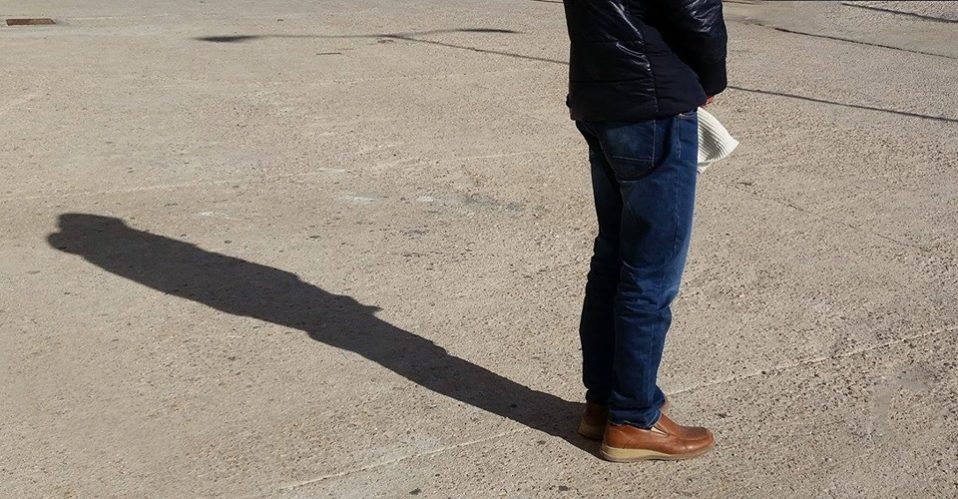In order to give people outside Chios the possibility to understand how it is to be in a refugee camp on the island, A Drop in the Ocean will present an alternative Christmas calendar this year. Each day until Christmas, we will post 24 amazing stories about the people we are so blessed to spend our everyday with.
December 17th – Mohammed
Written and photographed by Jamie Janson – Translated by Meyar
Bokra, bokra, bokra
Mohammed shuffles around Souda Camp. There is nothing for him to do all day except walk and sleep, he says. In the world outside Souda, where human beings have the chance to find work, follow their desires and live full lives, Mohammed was a teacher. In his hometown in Syria, close to the border with Turkey, his parents worked hard as farmers in order to get him into university. After he graduated he dedicated himself to teaching Arabic to young children.
The war didn’t destroy his house or loved ones directly, like so many others, but it demolished the family’s hope for a peaceful life together. One brother escaped to Germany, his sister to Sweden. Two other brothers weren’t so lucky. Accusations of Taliban membership were made and they were imprisoned by the Regime. One is now free, but the other is still in jail a year later. Mohammed’s mother urged him to leave before someone pointed a finger at him as well.
Aged 30, Mohammed’s posture is hunched, his knee jitters, depression seeps out of his eyes. The product of a single month of involuntary helplessness in Souda. A few refugees, those with multiple languages, are able to fight their way out of the apathy, taking on voluntary roles within the camp. But most are sinking beneath the weight of bureaucratic inertia, trapped between Europe’s walls of immigration paperwork and the humiliation of subsistence on meagre hand-outs.
His journey from home to the refugee camp was smoother than most. Mohammed says he experienced no bad treatment in Turkey, before mentioning not being fed for two days while in detention. A network of people smugglers transferred him across borders and housed him during his seven attempts to cross the Aegean Sea to reach the hospitality of Europe. Always demonised in our media, some smugglers are a refugee’s only hope, an underground travel agency that delivers them to safety, after the European Union abandoned any pretence of living up to the commitment to care for those fleeing persecution and war enshrined in its founding documents.
The one highlight of Mohammed’s day is his daily conversations with his mother back home. Here is another moment of interviewer embarrassment, admitting to only sporadic duty-texts to parents back home. Souda residents are shocked at the abandonment of European parents by their grown-up children. If Mohammed doesn’t share his day with his Mother, who’s voice daily reminds him of her love, he feels like he is no longer alive.
Mohammed’s future is as opaque as any other in the camp. He dreams of joining his brother in Germany and maybe even going back to university. But he is still waiting to attend the first of many interviews to assess his status, prove his worthiness to be in Europe. The interview was five days ago, but each time he takes the dusty refugee-only bus to the Vial Camp registration centre, to wait with the grim cluster of other despondent supplicants, he has been met with, “Bokra, bokra” (Tomorrow, tomorrow) – Almost everything in the refugee world happens tomorrow. It’s one of the first words of Arabic a camp volunteer learns, the most usual answer to any
Life is very bad in Souda Camp, Mohammed says. He feels trapped like an animal, and single men like him often feel they are at the back of the queue for compassion. All he wants is the chance to work, to do something with his life.
He looks round at the small children in the camp with despair. They dash around, full of energy, demanding hugs, piggybacks, attention, from anyone wearing a hi-viz jacket. Most of them attend some classes three afternoons a week in the town; hardly adequate nourishment for their developing minds. Could he get involved in doing some teaching here? He sighs: Where? The wind-blasted stony eating area? With what? Everything here is designed to defeat initiative, induce apathy. A cold non-place of waiting, where everything happens “bokra”.



Post a comment